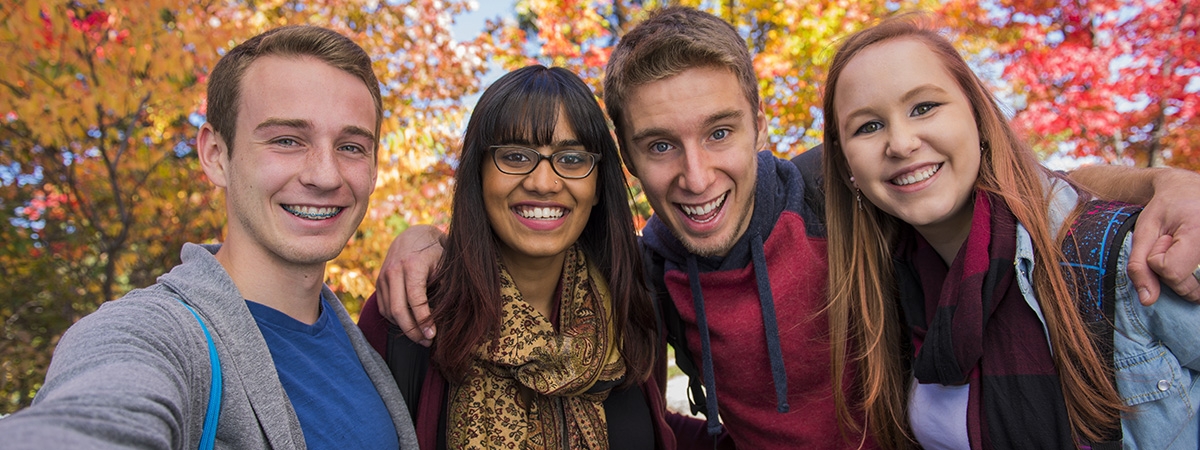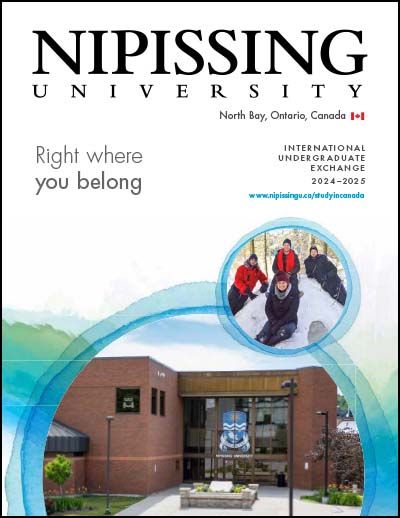
We are so excited that you have chosen to study at Nipissing University. This is an exciting time in your life, and we are happy to welcome you as the newest member of our international family. We cannot wait for you to feel the warm, tight-knit community that Nipissing prides itself on and our goal is to deliver you a truly Canadian experience.
No matter what country you are from or how long you stay, one thing will be certain: you will have the time of your life at Nipissing University. The school itself is small in population, but Nipissing’s history is rich and proud, and is one of the main attractions in the city that is considered “The Gateway to the North”. As the times have changed and technologies have advanced, we are very proud to offer world-class facilities, a state of the art athletic center, and a student experience that will rival no other.
If you have questions about the program, please contact us at internationalmobility@nipissingu.ca
Application Process
We’ve broken the application process down into the following easy steps:
Eligibility
Exchange students study at Nipissing for a single semester or a full academic year. To attend Nipissing as an exchange student, your home institution must have an exchange agreement with us. Check to see if your university is on our partner institutions list.
Nomination by your Home University
Students must be nominated for exchange by their home institution. Partners nominate their students using the Nipissing University Exchange Nomination form.
Nomination Deadlines
- May 1st for Fall Term (September to December)
- September 15th for Winter Term (January to April)
Nominations are reviewed to ensure that students meet the requirements for exchange and can move forward to completing the exchange application.
Nipissing Exchange Application
Following the submission and acceptance of their nomination, a student will receive detailed instructions on how to complete the exchange application.
Applications are submitted online using the Incoming Exchange Application form.
Deadlines
- May 20th for Fall Term
- September 20th for Winter Term
Exchange Application Course
Process to Review and Select Courses at Nipissing University
At Nipissing University some courses are taught over a period of 2 semesters (September-April) and have a designated code of FW meaning Fall and Winter.
These courses are worth 6 credits. Other courses are taught in either our Fall semester (FA = September-December), or Winter semester (WI = January-April). In these latter two cases the one semester courses are typically worth 3 credits each.
Exchange students coming to study just one semester beginning in September, will have to select courses offered in the Fall semester, which is coded FA.
- May 20th for Fall Term
Exchange students coming to study just one semester beginning in January, will have to select courses offered in the Winter semester, which is coded WI.
- September 20th for Winter Term
Note that courses coded FW are taught throughout the academic year from September to April.
Follow this 5-step procedure to search out course offerings:
- Go to: www.nipissingu.ca
- Select: WebAdvisor (top right corner)
- Select: Student tab
- Under Registration select Search for classes (no login required)
- Enter in the following three fields: Term: click drop down arrow and select 26FW – UG 2026/2027 FA/WI Subject: select your subject/discipline/area of study of choice Location: click, cursor down and select “NORTH BAY” Then click: SUBMIT
Exchange students must select courses that are being offered at the North Bay campus. Details regarding each specific class will be listed (ex: day of the week the class is being offered, class start/end time, room number, the professor’s name, and availability of seats, etc.)
Please note that you can view the course description by clicking on the course name and title. More information about Nipissing University course offerings:
To view a list of all Programs and Courses offered please go to: www.nipissingu.ca/calendar
Click on the desired discipline of study and then select “programs and courses” to view courses for that specific field of study International Exchange Student Course Pre-Registration Form:
Course Pre-Registration Form
Please list the courses you would like to take at Nipissing University during your semester or year on exchange. After the submission, you will be contacted by our Academic Advising office via email prior to your arrival.
If you have questions about the program selection, please contact us at internationaladvising@nipissingu.ca
In addition, please refer to the link “Courses Available List” open to exchange students.
Acceptance for Exchange
Following the review of their exchange application, a Letter of Acceptance (LOA) is emailed to the student.
For students studying in the Fall term or a full year, letters are sent in June and for students studying in the Winter, term letters are sent in October.
Letters of Acceptance are quite detailed and include information such as:
- Nipissing University Identification Number
- Important dates and deadlines
- Residence
Resources
Housing
Exchange Students
Space is reserved in our 4 on-campus residences for exchange students. You can live in any of our residence complexes. For more information please visit our residence website.
Note: Exchange students are not required to pay their residence deposit prior to arrival at Nipissing. Please do not send money before arrival. (paymytution payment)
What items are required for exchange students living on-campus?
Students will need sheets, a pillow and quilt plus a kit containing dishes, cutlery and cooking pots. However, all utilities and phone service are included. There is no mandatory meal plan for the on-campus residences, but an optional meal plan is available.
Costs and Fees
Most exchange students will pay tuition fees to their home institution rather than Nipissing University. However, in certain cases, incoming international exchange student will pay tuition fees at the Canadian domestic rate as noted in the International Student Handbook. If you are a fee-paying exchange this will be noted in your acceptance letter from Nipissing University.
Fees for exchange students
Note: The fees are subject to increase each academic year.
Immigration
You do not need a study permit if your studies in Canada will be less than 6 months.
If your studies are more than 6 months or if you would like to have the option to work on campus, you need a study permit. Application instructions for a study permit are available at the website of Immigration, Refugees, and Citizenship Canada.
Your acceptance letter from Nipissing will be part of the documentation you must include with your study permit application.
Most international students need a Temporary Resident Visa (TRV) or Electronic Travel Authorization (eTA) to travel to Canada.
- If you apply for a study permit, your TRV or eTA will be issued to you automatically
- If you don’t need a study permit, check to see if you need a TRV or an eTA. You should indicate that you plan to “visit Canada” or “visit as a tourist”. This letter may be used in a TRV application to explain the purpose of your visit to Canada.
Who Needs a Study Permit?
Most international students need a study permit to study at a Canadian university.
Most students must apply to Immigration, Refugees and Citizenship Canada (IRCC) for their study permit before coming to Canada to study.
These are general rules, but there are exceptions.
Citizens and permanent residents of the United States may apply for a study permit as they enter Canada.
A study permit holder has temporary resident status in Canada. They may remain in Canada and study at a Designated Learning Institution for the period indicated on the permit. Most Nipissing students have a study permit that indicates they may also do some work in Canada.
It’s important for students to know the terms and conditions that apply to study permit holders in Canada as well as what work may be authorized by their study permit. Students who don’t meet the conditions that apply to their status are at risk of losing their status and being asked to leave Canada.
Note: You may be required to provide Biometrics (fingerprints and photos) with your application. Please refer to the instruction guide in your application package, and/or visit this website for more details.
Students who require a visa should submit a copy of their Letter of Acceptance with their visa application to the nearest Canadian Embassy, Consulate or High Commission.
Orientation
An orientation session is offered in August/September for students attending in the Fall term and in December/January for students attending in the Winter term.
The session provides information and resources to help students transition successfully to student life at Nipissing.
All exchange students are required to participate in the session preceding the start of their exchange term.
Students are provided with the session details in advance.

